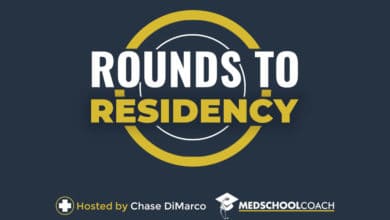Chase DiMarco talks to Dr. Basil Kahwash, a board-certified allergist/immunologist who manages asthma, allergies, rare immunodeficiency conditions, and targeted biologic treatments. They talk about challenges facing allergy and immunology residents, the advantages of sub-specialization, and choosing the right residency program.
- [01:07] Challenges Facing Allergy and Immunology Residents
- [06:15] Designated Path to a Career in Allergy and Immunology
- [07:31] Allergy and Immunology Training in Internal Medicine
- [10:56] Interesting Sub-specialties in Allergy and Immunology
- [14:30] Benefits of Choosing a Career in Internal Medicine
- [17:58] The pros of Sub-specializing
- [19:19] Choosing the Right Residency/Fellowship Program
- [22:20] Tips for Pursuing a Career in Allergy and Immunology
Challenges Facing Allergy and Immunology Residents
Allergy and immunology is a branch of medicine that covers the care and treatment of the immune system, allergic reactions, and related symptoms. This specialty deals with hundreds of immune diseases that range from asthma, rhinitis, and life-threatening reactions to drugs, food, or vaccines. Students pursuing this specialty must complete a three-year residency in pediatrics or internal medicine or a four-year residency in medicine-pediatrics. According to Dr. Kahwash, dealing with both adults and children is one of the biggest challenges facing residents who choose this specialty. This is because students have to adjust their viewpoint when handling patients from different age groups. The matter is further compounded by the fact that residents sometimes treat rare and potentially life-threatening disorders of the immune system that are not necessarily taught in medical school.
Allergy and Immunology Training in Internal Medicine
Most students struggle to decide the type of doctor they want to become when choosing a residency. Interestingly, the one specialty that’s often overlooked is internal medicine. Internal medicine focuses on the broad medical needs of adults. Thus, students who take up internal medicine enjoy treating complex system interactions, expansive thinking, and longitudinal relationships with patients.
Further, internists who sub-specialize in allergy and immunology manage a broad spectrum of allergic, respiratory, skin, and immune disorders. Hence the need for doctors to collaborate with other specialists such as dermatologists, pulmonologists, and nutritionists. Dr. Kahwash explains that these interactions enable specialists to niche down and still enjoy multi-disciplinary interactions.
Choosing the Right Residency Program
According to Dr. Kahwash, one of the most important decisions you’ll ever make as a medic is choosing a residency program. This is a critical choice that will shape the rest of your career. He explains that a good decision will make you more likely to be satisfied with your professional life down the road. However, chances are, you won’t fully understand what a specialty is like until you start your residency program. Still, that doesn’t mean you can’t research it and formulate a plan. So, make time for in-depth research into residency programs by reflecting on your aspirations and professional goals. Equally important are things like geography and the culture of the program.
Check out Dr. Kahwash’s article on food allergies and connect with him via LinkedIn, Clubhouse, and Twitter
Sign up for a Free Coaching session with Chase DiMarco, sponsored by Prospective Doctor! You can also join the Med Mnemonist Mastermind FB Group today and learn more about study methods, memory techniques, and MORE! Do check out Read This Before Medical School. Like our FreeMedEd Facebook page and find our Medical Micro Course, Blog posts, and Podcasts at FreeMedEd.org! Feel free to Email any Questions or Comments.
